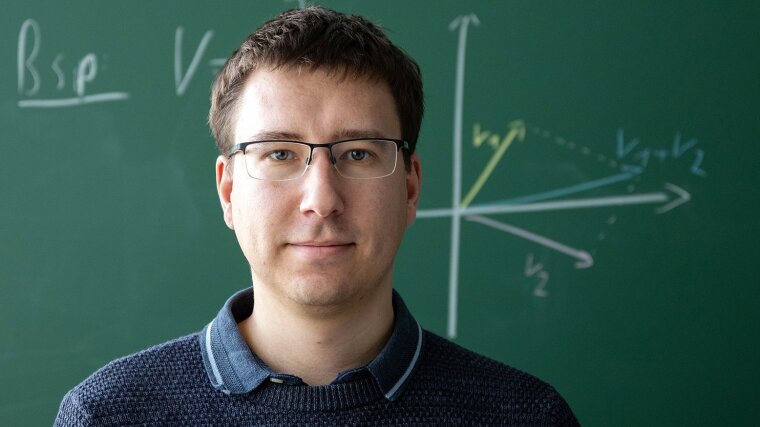
- Awards and Personnel
- Studies and Teaching
Published: | By: Stephan Laudien
The mathematician Dr Manuel Quaschner has been awarded the University of Jena’s Teaching Award 2025 within the thematic priority area »Teaching and learning culture in times of AI«. Quaschner receives the award for the exercise and tutorial »Linear Algebra I«. The Teaching Award is endowed with 2,500 euros and will be presented at a ceremony on 18 November on Dies Legendi—Teaching Day.
Demonstrating solutions and deepening knowledge
Dr Quaschner describes what linear algebra is all about as follows: »Many people will be familiar with two- or three-dimensional vectors from their school lessons. Such vectors can be added together or stretched and compressed by multiplying them by a number.« Linear algebra attempts generalize these properties to more abstract structures. For example, polynomial functions can also be added together or multiplied by a number.
»This provides the abstract structure of a vector space and the aim of linear algebra is to examine the properties of such abstract objects in general, whereas at school only the explicit examples are considered.« It is precisely this more abstract approach that poses a major challenge for many first-year students in the transition from school to university mathematics. To solve this dilemma, Dr Manuel Quaschner has developed a method to help students assess their own skills using a Moodle self-test. »We want to enable students to deepen their knowledge from the lecture by means of example exercises«, says Dr Quaschner.
Critically scrutinizing AI-generated solutions
The aim is to take a more targeted approach to homewor assignments, as these are assessed and taken into account for exam admission. Among other things, mathematical proofs generated with the help of an AI tool are used. Students are asked to critically analyse these proofs and check them for logical consistency and technical correctness. Manuel Quaschner says that some of the homework assignments submitted suggest that they were completed with the help of AI. However, this ultimately does not benefit the students because they have not understood the correct solutions and because AI is prone to errors.
The new method highlights the difficulties of using AI and the solution is explained in a video by a tutor if the task could not be solved independently. »Students now have the opportunity to test their knowledge and at the same time gain a deeper understanding of the correct solutions«, says Manuel Quaschner. The voluntary offer is suitable for reducing the discrepancy that previously existed between easy in-class tasks and tricky homework assignments. Ultimately, says Quaschner, the whole thing is a step-by-step model.
The course is based on the lecture by Prof. Dr Vladimir Matveev, followed by in-class tasks and finally the homework. The latter is assessed and is a prerequisite for admission to the examination. The jury’s statement acknowledges the successful combination of analogue and digital teaching formats. From the students' perspective, the teaching concept is praised as »exemplary in terms of subject matter, didactics and technology«. Together with Prof. Matveev, Manuel Quaschner is now developing digital learning and testing formats for the compulsory lecture on geometry.
Further development of teaching formats with the Academy for Teaching Development
Dr Manuel Quaschner studied mathematics in Erlangen and has been working as a research assistant at Friedrich Schiller University Jena for almost three years. He uses the help of the Academy for Teaching Development to further develop teaching formats. The award winner says he plans to use the prize money for the 2025 Teaching Award to create more mock exams.